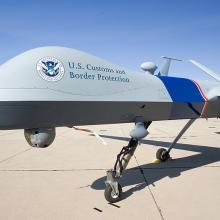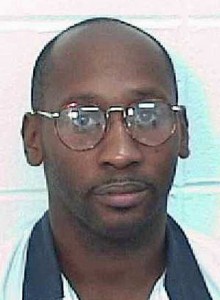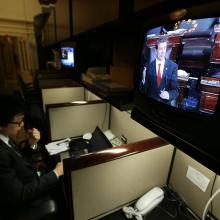killing
Everything must change.
Injustices around the world and here at home are coming to light despite a long, willful blindness. Half a world away, the long-muted voices of the victims of American military policy were allowed to break through the wall of propaganda and infotainment used to keep them hushed. A recent New York Times report reveals one of the worst-kept (actually un-kept, but vastly underreported) secrets of our government: that we often do not know who we are killing with drones.
And at home, in Baltimore, the death of Freddie Gray in police custody has caused long-simmering tensions – born of institutionalized segregation, nearly inescapable poverty, and a scourge of police brutality – to erupt in an uprising of passionate resistance, with destruction punctuating otherwise peaceful marches. Media coverage has given far more attention to the “riots” than to the systemic violence that has kept so many African Americans, not only in Baltimore but throughout the country, living in poverty and insecurity.
AFRICAN AMERICANS around the country are finding it is dangerous to call 911. Jack Lamar Roberson’s family in Waycross, Ga., discovered this the hard way when they placed an urgent call to 911 in October 2013 because his fiancée thought that he had taken an overdose of diabetes medicine.
Instead of sending EMTs, the dispatcher sent the police. Within 20 seconds of being in the house, police shot Roberson nine times, with bullets striking his back, arms, chest, and head as he held his arms up in the air. Although he was a veteran, he did not die from bullet wounds at the hands of strangers in a foreign land. Instead, white police gunned him down in his home.
Killings like this—which could be called anti-black hate crimes by police—are far too common. “Operation Ghetto Storm,” a 2012 report by the Malcolm X Grassroots Project, revealed that white police officers, security guards, or vigilantes kill an unarmed black man, woman, or child every 28 hours in the U.S. In 2012, police officers shot 57 people in Chicago—50 were black, two were white. Miami police officers killed seven black men within eight months in 2011. The Houston-based African-American News & Issues headlined an article this spring: “Open Season on Blacks in Texas: Cops Are Shooting First & Not Asking Questions.”
These police killings of black people emerge out of a culture and system of white supremacy. In such a context, police killing of black people is not a black problem. It is an American problem that shreds the curtains of democracy.
I first learned about President Obama’s comments about racism and the Trayvon Martin case last week when a Facebook friend posted a link with this comment:
“Full text of the American President’s divisive and racist remarks today. He moves smoothly into his new role as race-baiter in chief.”
My friend’s anger was matched by many others from PowerLine to Breitbart. But what I read seems to me as controversial as tomorrow’s sunrise and incendiary as wet newspaper.
Let me try an analogy.
Imagine that Joe Lieberman had been elected our first Jewish president. And that in a moment of crisis, he felt compelled to explain that some reaction to even the hint of anti-Semitism is partly explained by the Jewish cultural memory of the Holocaust. And he included personal anecdotes about growing up Jewish in America.
Would he be accused of being divisive and guilty of whatever the Jewish equivalent of “race-baiting” might be?
A fundamental principle [of ancient Greek tragedy], often overlooked, is that the double and the monster are one and the same being.
- René Girard, Violence and the Sacred (p. 160)
The debate about the use of drone strikes in the so-called “War on Terror ” has shed light on an inevitable calculus of war: how many civilian casualties can be tolerated in pursuit of our goals? President Barack Obama, in his speech on May 23 at National Defense University, referred to the drone strikes in Pakistan, Yemen, and Somalia, admitting, “It is a hard fact that U.S. strikes have resulted in civilian casualties, a risk that exists in all war.” But of course, our wars and our use of drones were conceived as a legitimate response to the civilian deaths on 9/11 and a defensive maneuver to prevent future attacks.
Obama Defends Drone Attacks
In his speech, Obama further justified the use of drones by stating it reduces the number of civilian casualties compared to boots-on-the-ground wars. Though the numbers are hard to determine, it has been reported by the Canadian Broadcasting Corporation that civilian casualties caused by our invasion of Iraq number somewhere between 55,000 and 60,000. In Afghanistan, from the time reporting began in 2007, the Guardian reports that the total number of civilians who have lost their lives in the armed conflict to be 14,728. For drone strikes, the highest estimates put total civilian deaths at around 950, indisputably a better number.
The Illogical Logic of Violence
Reducing the number of deaths caused by our use of violence is a worthy goal, and Obama does seem genuinely engaged in drawing the number down. So for the sake of argument, I will take him at his word. But (you knew there was a but coming!), he is trapped, as so many of us are, within the logic of violence.
While I stand with Sen. Rand Paul on the question of the use of militarized spy drones in American airspace and (potentially) on Americans, I am deeply troubled by our use of these weapons in other lands, too, where they are responsible for the deaths of hundreds of children and other innocents.
There's something dishonorable about killing without the risk associated with the act, no matter how heinous the target or valuable and beautiful the persons you put at risk in order to personally kill.
“Idolatry of guns.” What does that mean, exactly?
It might be hard to admit, but if you think about it, you can see that many groups in the United States see guns as sacred. Guns are not only the solution to our problems, they will save us from evil. Wayne LaPierre, the executive vice president of the National Rifle Association, stated this himself: “The only thing that stops a bad guy with a gun is a good guy with a gun.”
Do we really believe this? If we stop and think about it, we don’t. Our protection does not come from guns, and we do not live in a binary society of good and evil, where the right to hold dangerous weapons can be allocated to people who are entirely virtuous.
News flash: The U.S. is using remotely piloted drones for targeted killing strikes against suspected terrorists. If you don’t think that’s news, you’re right. For years, it’s been the worst kept secret in Washington, but a speech yesterday by White House counterterrorism adviser John O. Brennan was the first official acknowledgement of the program. He insisted that it is consistent with U.S. and international law, even while admitting that civilians have been killed.
The news report noted,
"Brennan’s speech was also noteworthy, however, for what he withheld. He did not disclose how many people have been killed, list all the locations where armed drones are being flown or mention the administration’s increasing reliance on “signature” strikes, which allow the CIA to fire missiles even when it doesn’t know the identities of those who could be killed".
While this policy of targeted assassination should be ended immediately, the admission that it exists is an important step toward an important public debate.

An AUV, image via http://bit.ly/AitjlI
Since mid-November, the CIA had not launched a drone attack against Pakistan. On Sunday, the New York Times front page prominently featured a story headlined Lull in Strikes by U.S. Drones Aids Militants.
Quoting an array of administration officials, diplomats, intelligence analysts, and one “American government official with decades of experience in Pakistan;” the picture painted was one of a bolder al Qaeda, increased attacks on Pakistani security, and threatened strikes against U.S. troops in Afghanistan. It was a “sky is falling” account of the dire effects of no drones.
In my more cynical moments, I think such stories, almost entirely from anonymous sources, are a not-so-subtle way of applying political pressure. It’s one of the ways media and politics interact in Washington. And, sure enough, yesterday, the attacks resumed. Reuters reported that “missiles hit a home on the outskirts of the town of Miranshah in North Waziristan, killing at least four militants.” Recess is over, back to business.
Just days before the country’s first democratic election (set for Nov. 28), 27 Coptic protestors were killed for demonstrating against the military’s recent burning of a Christian community center. And despite drawing global attention, which included anti-violence demonstrations in the U.S., Canada, and Europe, the Global Post reports that, "the demonstrations reflect mounting fears in Egypt’s Coptic community and its Diaspora that after the pro-democracy uprising of earlier this year the predominantly Muslim Egyptian society seems as indifferent to the Christian minority’s concerns as ever. “
 Davis is set to die on Wednesday for the killing of off-duty Savannah officer Mark MacPhail, who was slain while rushing to help a homeless man being attacked. It is the fourth time in four years his execution has been scheduled by Georgia officials...The decision appeared to leave Davis with little chance of avoiding the execution date. Defense attorney Jason Ewart has said that the pardons board was likely Davis' last option.
Davis is set to die on Wednesday for the killing of off-duty Savannah officer Mark MacPhail, who was slain while rushing to help a homeless man being attacked. It is the fourth time in four years his execution has been scheduled by Georgia officials...The decision appeared to leave Davis with little chance of avoiding the execution date. Defense attorney Jason Ewart has said that the pardons board was likely Davis' last option.
? U.S. troops on the front line believe that the war will go on for another 10 years after they leave.
? An audit shows that the surge of U.S. civilian advisers has cost nearly $2 billion.
? The U.S. mission in Afghanistan has suspended the transfer of detainees to several Afghan jails, following torture allegations.
Two long pieces this weekend described "one hell of a killing machine," and "the dark matter
The recent British film In Our Name is a returning-soldier drama featuring a married woman, Suzy, who leaves her husband and little girl to fight in Iraq. Because she's involved in the killing of a little girl during her tour-this part is based on a true story, but it happened to a man -- she returns home only to steadily fall apart under the stress of soul-destroying anxieties.
I have gotten so used to stories of violence in the news every morning that I confess they don't move me as much as they should, or used to. Today: Three straight days of killing in Karachi with 42 dead; Syrian tanks shelling the city of Hama, where more than 100 people have died since Sunday; U.N. peacekeepers killed by a landmine in Sudan; daily deaths in Libya; bombings in Baghdad and assassinations in Kandahar. It goes on and on.
Hidden Battles is a 65-minute documentary which follows a female Sandinista rebel, an Israeli officer, a Palestinian freedom fighter, and two American soldiers as they come to terms with their combat experiences. The film offers unique insight and hope into the internal conflicts that human beings around the world continue to face long after they have left the battlefield.
The documentary listens to the stories of these former soldiers as they reconcile what it means to have killed another human. A Vietnam veteran recalls that when he first killed, he was gripped by the feeling that he "did something -- literally against God." Watch this film and see how these veterans have fought to overcome. Each soldier deals with killing in his or her own unique way. Hidden Battles shows five ways in which this act is integrated into five different lives. Ultimately these stories testify to the resilience of the human spirit and hopefulness for the future.





